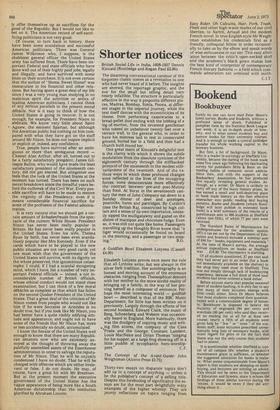Shorter notices
British Social Life in India, 1608-1937 Dennis Kincaid (Routledge and Kegan Paul E3.00).
The disarming conversational candour of this forgotten classic comes as a revelation to one who had never heard of it before. The insights are shrewd, the reportage graphic, and the eve for the small but telling detail very nearly infallible. The structure is particularly effective in the way it pinpoirits different places, Madras, Bombay, Simla, Poona, at different stages in the imperial journey, while the text itself dances with the eccentricities of its theme, from performing cassowaries to a bread-pellet duel ending with the lobbing of a leg-of-mutton, from the reverend gentleman who tossed an unbeliever twenty feet over a terrace wall, to the general who, in order to have his mistress laid to rest in consecrated ground, buried her in a field and then had a church built round her. • One great merit of Kincaid's delightful text is the clarity with which it shows the subtle modulation from the dissolute cynicism of the eighteenth century through the stiffbacked protocol of the nineteenth to the modest utilitarianisms of the twentieth. And of the various ways in which these profound changes were reflected in the lives of the occupying forces, none demonstrates more effectively the contrast between pre-and post-Mutiny than food. At Surat in the seventeenth century the men of John Company sat down to a Sunday dinner of deer and antelopes, peacocks, hares and partridges. By Curzon's time the British Raj, constricted by high collars and a sense of its own importance, uneasily sipped the mulligatawny and gazed on the dishes of marzipan and chocolate fudge. Even so, it was still not quite like home. Passengers travelling up the Hooghly River knew that "a tiger would occasionally be found on board in the morning, and a passenger or two miss ing." B.G.
A Goldfish Bowl Elisabeth Lutyens (Cassell £4.00) Elisabeth Lutyens proves once more the rule that all Lyttons write; but not always in the silver fork tradition. Her autobiography is an honest and moving account of the enormous obstacles, ranging from Theosophical detours with her mother to the more sordid reality of bringing up a family, in the way of her proving herself as a composer of eminence. Perhaps the most interesting world — goldfish bowl — described is that of the BBC Music Department, for little has been written on it
, previously. Largely through the efforts of her second husband, Edward Clark, the music of Berg, Schoenberg and Webern was occasionally heard in England. More habitually, there was the drudgery of copying music and writ. ing film scores, the company of the Casa 'Prada and the George: Constant Lambert, Louis MacNeice and Dylan Thomas "singing for his supper, as a large frog showing off in a little puddle of sycophantic hero-worship pers." C.F.
The Concept of the Avant-Garde John Weightman (Alcove Press £3.75)
Thirty-two essays on disparate topics don't add up to a concept of anything — unless it be the publisher's concept of a selling title. Despite this foreboding of significance the essays are for the most part delightfully witty examples of the higher whimsy. They are jaunty reflections on topics ranging from
Easy Rider, Oh Calcutta, Hair, Pork, Trash, Flesh and other high-water marks of our civil liberties, to Sartre, Artaud and the modern French novel. In true English style Mr Weightman establishes his credentials first as a friendly, colloquial fellow in order occasionally to take us by the elbow and speak words of wise seriousness in our ear. This easy alteration between the critic's open-necked shirt and the academic's black gown makes him the best kind of interpreter of contemporary French literary fashions — a field which commands admiration not unmixed with mirth.
C.I.T.


































 Previous page
Previous page